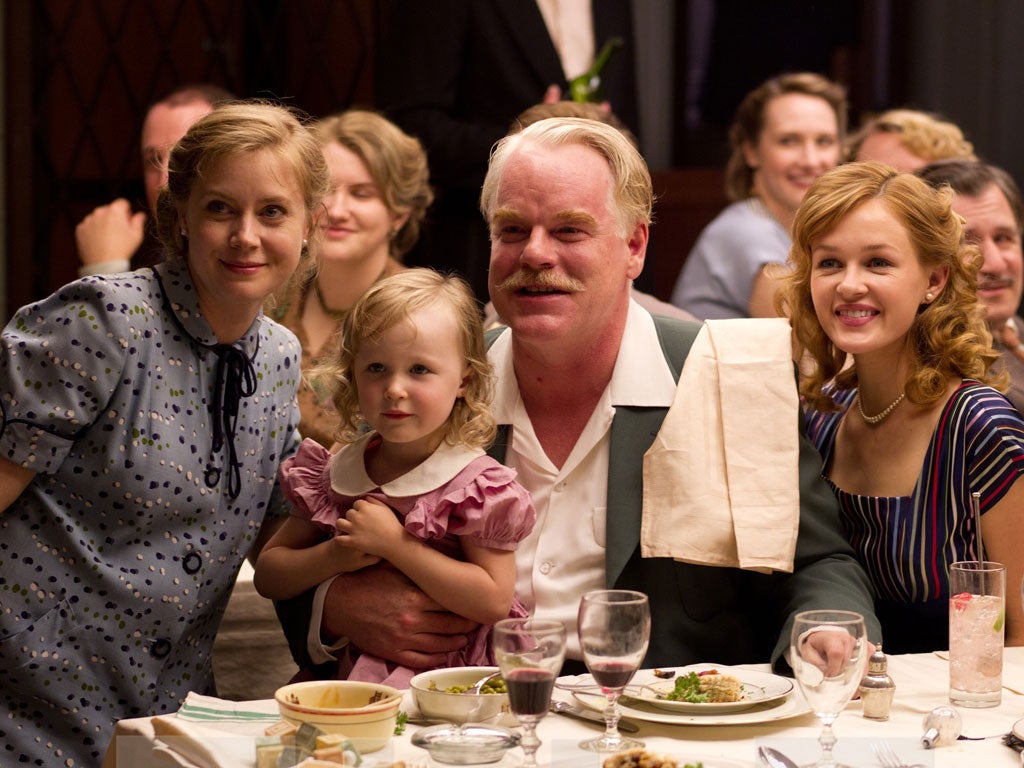The Master (15)
A cult above, but not quite mastery

On first hearing that Paul Thomas Anderson's new film was to be called The Master I thought: isn't he a little young for autobiography? There are plenty, myself included, who would not dispute Anderson's claim to be at least a master-in-waiting, for even in his debut, Hard Eight (1996), a tight gambling picture, there were seeds of brilliance.
By the time of There Will Be Blood (2007) we were looking at something close to greatness, fitful and eccentric but also visionary and luminous. As it transpires, The Master is about another wayward American individual, not a film-maker but a leader of a movement known as "The Cause". This film too has scenes, moments, touches of greatness, of a sort only Anderson could have conjured. But, much as I wished it otherwise, it's not a great film, and in its latter stages becomes an actively frustrating one.
Let's accentuate those positives. Its opening half-hour is magnificent, as weirdly haunting in its build-up as the mining scenes that formed the prologue of There Will Be Blood. Joaquin Phoenix plays Freddie Quell, a sailor demobbed from the US Navy at the end of the Second World War. Damaged by service, Freddie can't settle into civilian life, drifting about, chucking in jobs, tipping back the toxic hooch he started brewing aboard ship (chief ingredient: missile fuel).
His fate changes when he gets back on the water, jumping on a partying yacht he passes one evening. He's hauled in front of the ship's "commander", a compellingly self-possessed character named Lancaster Dodd (Philip Seymour Hoffman) who, instead of turning the stowaway ashore, invites him to stay for his daughter's wedding. Who is this Dodd? He tells Freddie: "I am a writer, a doctor, a nuclear physicist and a theoretical philosopher... but I am, above all, a hopelessly inquisitive man, just like you." It sounds like something Orson Welles might have said, and in Hoffman's bulky overweening presence we discern a Wellesian grandeur – and something else.
The film examines the dynamic that springs up between the two men. The performances are extraordinary. Phoenix, back curved, arms dangling, suggests an apeish truculence in Freddie that Dodd tries to curb (or quell) through his "processing", an intense, pseudo-analytic questioning that forms the basis of his movement. Talking out the side of his mouth, Phoenix seems to have taken Popeye as inspiration – half of his speech I couldn't decipher, the other half I'm not sure I wanted to. His eyes say much more. Hoffman, an Anderson regular, has a bullish eloquence, even if what he says sounds like baloney. Light on his feet for a large man, Hoffman is by turns charismatic, playful and menacing. Challenged by a nay-sayer when in full flight he hisses an obscenity, and the slip of his genial mask is wonderful to behold.
So what is The Master about? At one level it is a sly though not disrespectful inquisition into a cult, "The Cause", a mixture of grief counselling, self-help, time-travel reincarnation, and hypnosis. Anderson has argued that it is not a portrait of L Ron Hubbard and Scientology, so emphatically that one feels in some way it must be. (I would love to have been at the screening Anderson held for Tom Cruise.) At another level it is a kind of love story between two men, who see their better selves mirrored in each other. "You inspire something in him," Dodd's coolly watchful wife, Peggy (Amy Adams), tells Freddie. But it is perhaps more ambitious, its subject not a cult but a country.
While nobody could mistake Freddie for an American everyman, it is tempting to see in his situation – lost, fearful, edging towards breakdown, eager for salvation – the shadow of postwar America. The lure of individualist authority is but one symptom of a national gullibility.
If Anderson keeps his purpose mysterious, he doesn't stint on delivering a sumptuous-looking movie. He keeps startling us with his use of light, such as the moment Freddie bursts out of a dark shack into grainy daylight and flees across a cabbage field, pursuers in his wake. His sense of composition, his lovely fluid camerawork and his feel for period currently have no match in American film-making, and for an hour or so you keep thinking – is this the best movie of 2012?
And then you stop thinking it. The Master turns in on itself and starts to ape the monomania that is partly its subject. Freddie's indoctrination involves Dodd ordering him to walk up and down a room, describing the wall, then the window, ad infinitum. Their battle of wills seems to hark back to the brilliant rhetorical dingdong between Daniel Day-Lewis and Paul Dano's charlatan pastor in There Will Be Blood, only there it emerged as propulsive drama and deranged comedy. Here, the idiotic tedium of cult programming begins to infect the narrative with a commensurate tedium.
We also witness a volcanic eruption of rage, without which no Anderson picture could be complete. When Dodds and Freddie are arrested and thrown into jail, the latter goes berserk and destroys the toilet in his cell: man in chains – smash the cistern! The film almost appears to be admitting it has gone as far as it can (it hasn't), and is merely reprising Phoenix's earlier freak-outs.
The endgame, quieter and more reflective than one might expect, could have played out half an hour earlier without significant loss. I never felt my admiration of Anderson flag, and The Master will perhaps in time slot neatly into his remarkable career pattern. But I have to admit that I didn't wish it a minute longer.
Join our commenting forum
Join thought-provoking conversations, follow other Independent readers and see their replies
Comments
Bookmark popover
Removed from bookmarks